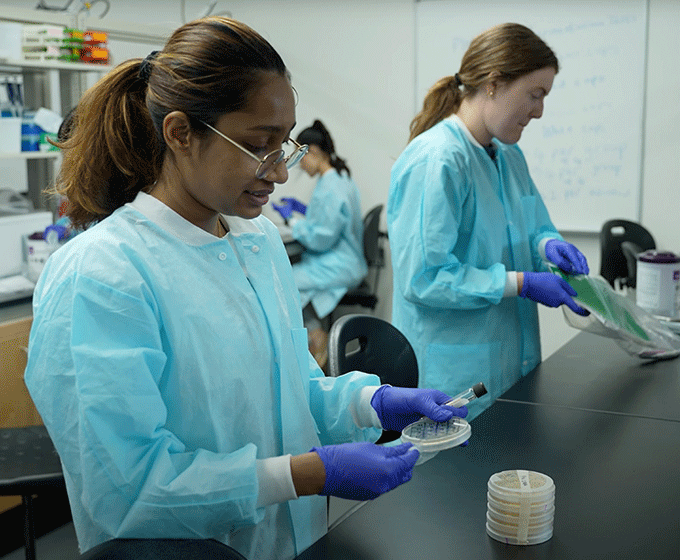
Molecular microbiology and immunology student Nishat Shama observes microbial colonies in soil samples in a UTSA laboratory.
MAY 9, 2025 — As part of a UTSA microbiology course, students like Nishat Shama, a molecular microbiology and immunology major, have collected local soil samples to search for microorganisms that could lead to the discovery of new antibiotics.
The U.S. Centers for Disease Control and Prevention describes antimicrobial resistance as “one of the world’s most urgent public health problems.” It occurs as pathogens develop defense mechanisms against common antibiotic medications.
According to the World Health Organization, the process is driven by misuse and overuse of antibiotic drugs. Meanwhile, the development of new, more effective antibiotics has not kept pace with rising resistance levels, leaving a growing number of bacterial infections untreatable.
The UTSA undergraduate course, part of the Place-Based Soil Data Interpretation and Research in Texas (PBS-DIRT) project and supported by a $395,000 USDA grant, gives students a hands-on approach to fighting the global antibiotic resistance crisis.
Students participating in the module are collecting soil samples in the San Antonio area and analyzing soil data to potentially find new antibiotics. The class has diluted their soil samples, plated them and observed microbial colonies that may hold promising antibiotic properties.
They will contribute their findings to a global database managed by the Tiny Earth Initiative, an organization that supports student research in pursuit of more effective antibiotics.
According to Assistant Professor Hamid Badali, Tiny Earth is a global initiative involving over 17,000 instructors across the U.S., Europe, Asia and Australia. UTSA students gain both research skills and a deeper awareness of the environmental factors tied to public health.
“I think it’s very educationally enriching to learn how antibiotics are actually made,” Shama said. “This project has helped me learn that our environment is important, and we should pay more attention to it.”
UTSA offers many hands-on learning opportunities to set students up for success in the workforce. By 2028, the university aims for 75% of its undergraduates to participate in a classroom-to-career experience.
UTSA Today is produced by University Communications and Marketing, the official news source of The University of Texas at San Antonio. Send your feedback to news@utsa.edu. Keep up-to-date on UTSA news by visiting UTSA Today. Connect with UTSA online at Facebook, Twitter, Youtube and Instagram.
After getting your student settled in their room, connect with other UTSA families at our Family Get Together. Attendees need to RSVP for the event.
Rock & Brews Restaurant - 5702 Landmark Pkwy, San Antonio, TX 78249Late Night at the Rec is an awesome UTSA tradition that turns a typical information session into an exciting night of fun. It's a unique opportunity to meet new people and reconnect with old friends.
Campus RecreationCheer on the UTSA Soccer team as they take on Lamar in the first home game of the season.
Park West FieldShow your UTSA pride with our spirited crew—Rowdy, Cheer, the Spirits of the Roadrunner, and the incredible Spirit of San Antonio Marching Band (SOSA)—as we light up the night in true Roadrunner style.
Main Campus East Lawn, Main CampusAnnual Giving will host a First Day of School celebration to welcome students back to campus. We will have giveaways and photo opportunities.
Sombrilla Plaza, Main CampusEnjoy snacks while connecting with Adobe reps and student ambassadors. Download or log into the Adobe Express app to snag swag and unlock exclusive back-to-school templates. It’s a fun, fast way to get creative and start the school year with bold moves.
Central Plaza, Main CampusCelebrate the merger of UTSA and UT Health San Antonio with a pop-up featuring free t-shirts, exclusive swag, and interactive photo opportunities. Open to all students, faculty and staff. Supplies are limited!
Sombrilla Plaza, Main CampusThe University of Texas at San Antonio is dedicated to the advancement of knowledge through research and discovery, teaching and learning, community engagement and public service. As an institution of access and excellence, UTSA embraces multicultural traditions and serves as a center for intellectual and creative resources as well as a catalyst for socioeconomic development and the commercialization of intellectual property - for Texas, the nation and the world.
To be a premier public research university, providing access to educational excellence and preparing citizen leaders for the global environment.
We encourage an environment of dialogue and discovery, where integrity, excellence, respect, collaboration and innovation are fostered.